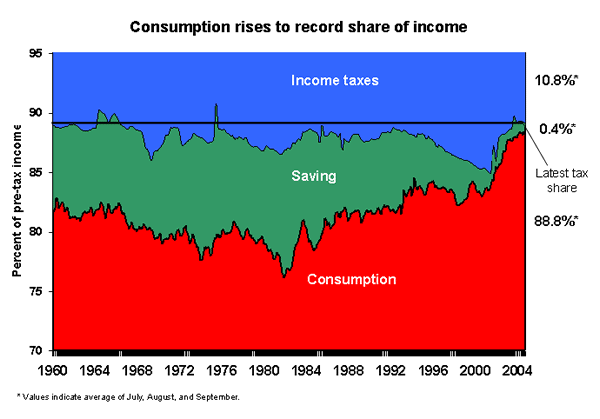See Snapshots Archive.
Snapshot for November 3, 2004.
Consumption grows at the expense of saving
The U.S. economy has depended very heavily on consumption growth to drive the economy in the last several years, but cannot do so indefinitely. Americans spent a record 88.8% of their pre-tax income last quarter. Between 1960 and 2000, consumption accounted for an average of 81.0% of pre-tax income. Just four years ago, that ratio was still 83.1%. Consumption has risen by 5.7 percentage points of pre-tax income in just four years only because of deep cuts in both saving and income taxes.

On average, Americans have nearly stopped saving. While some people do save, others are spending more than their income and going into debt. Last quarter, total saving was just 0.4% of pre-tax income, down 1.8 percentage points from the 2.2% saving of four years ago. That’s the lowest level of personal saving since the Great Depression of the 1930s.
Over the 1960 to 2000 period, personal saving averaged 7.0% of pre-tax income. The decline in saving seen in the late 1990s was often explained by the run-up in the stock market, which allowed personal wealth to rise without saving. Despite the subsequent decline in the stock market, however, saving has continued to decline. Many experts believe that to prepare for retirement and other purposes, American households in the aggregate need to save at least 5% of income, and probably more.
Income taxes (federal, state, and local) were 10.8% of pre-tax income last quarter, compared to the average 12.1% of income for the 1960 to 2000 period and the 14.7% share of income four years ago. Between 1960 and 2003, income taxes had reached a similarly low share of pre-tax income only twice before: for a couple of years after the 1963 tax cut and during the few months of the temporary 1975 tax cut. Such low income tax revenues have contributed to the decline in personal saving as well as to government budget deficits, which may be seen as “negative saving” by government.
Economists sometimes talk about the “paradox of thrift.” If everyone decides at once to save more, it can reduce consumption enough to cause output to go down and a loss of jobs and income, and actually result in less total saving. The same logic applies to increased thrift by government as well as by individuals.
We can no longer expect consumption to be propelled by further income tax cuts or saving reduction. With strong enough income growth, however, total consumption could continue to grow even as its share of income falls and the share of both saving and taxes rise. Unfortunately, there has not been sufficiently strong income growth to allow that to happen in recent years.
This Snapshot was written by EPI Research Director Lee Price.
